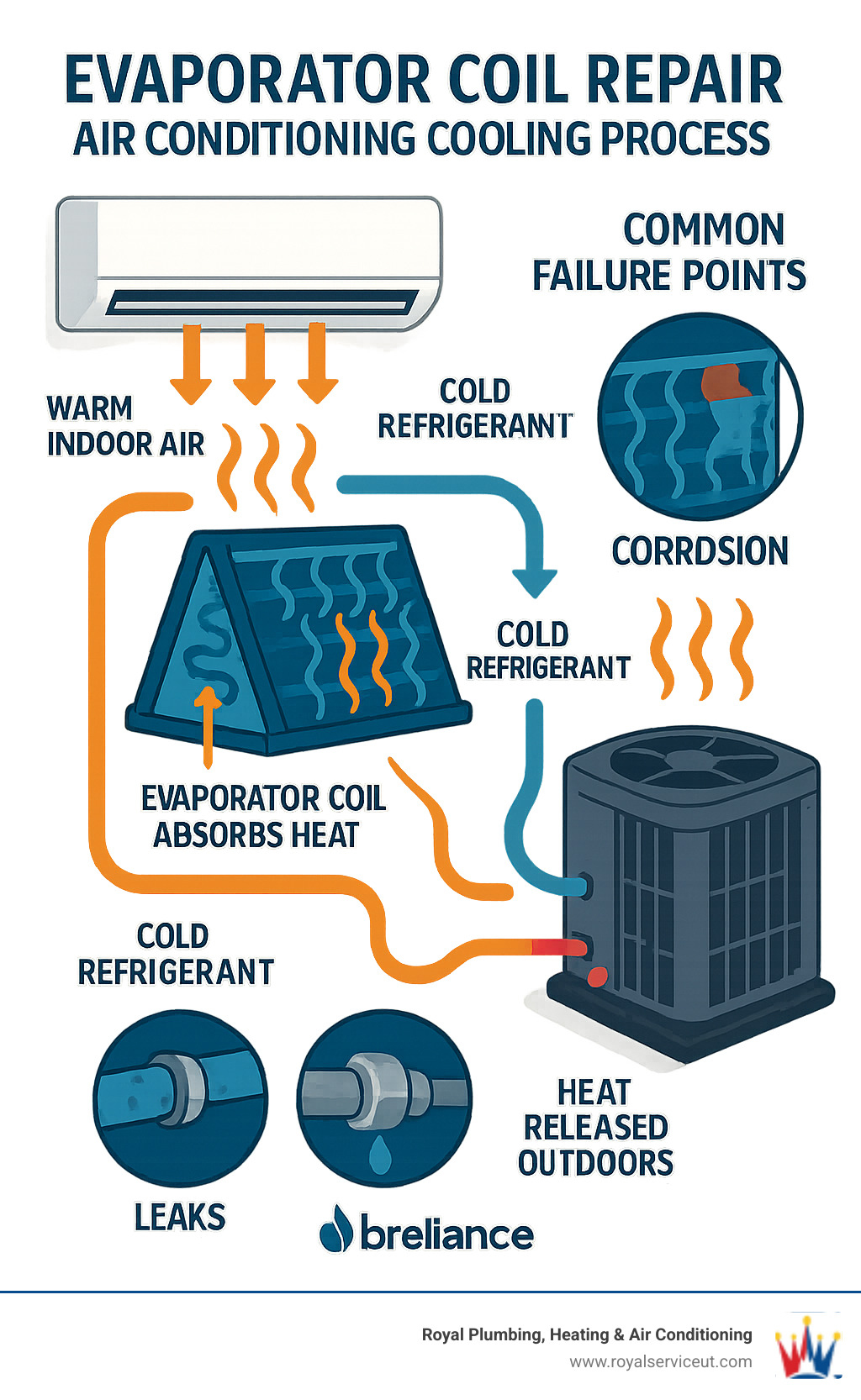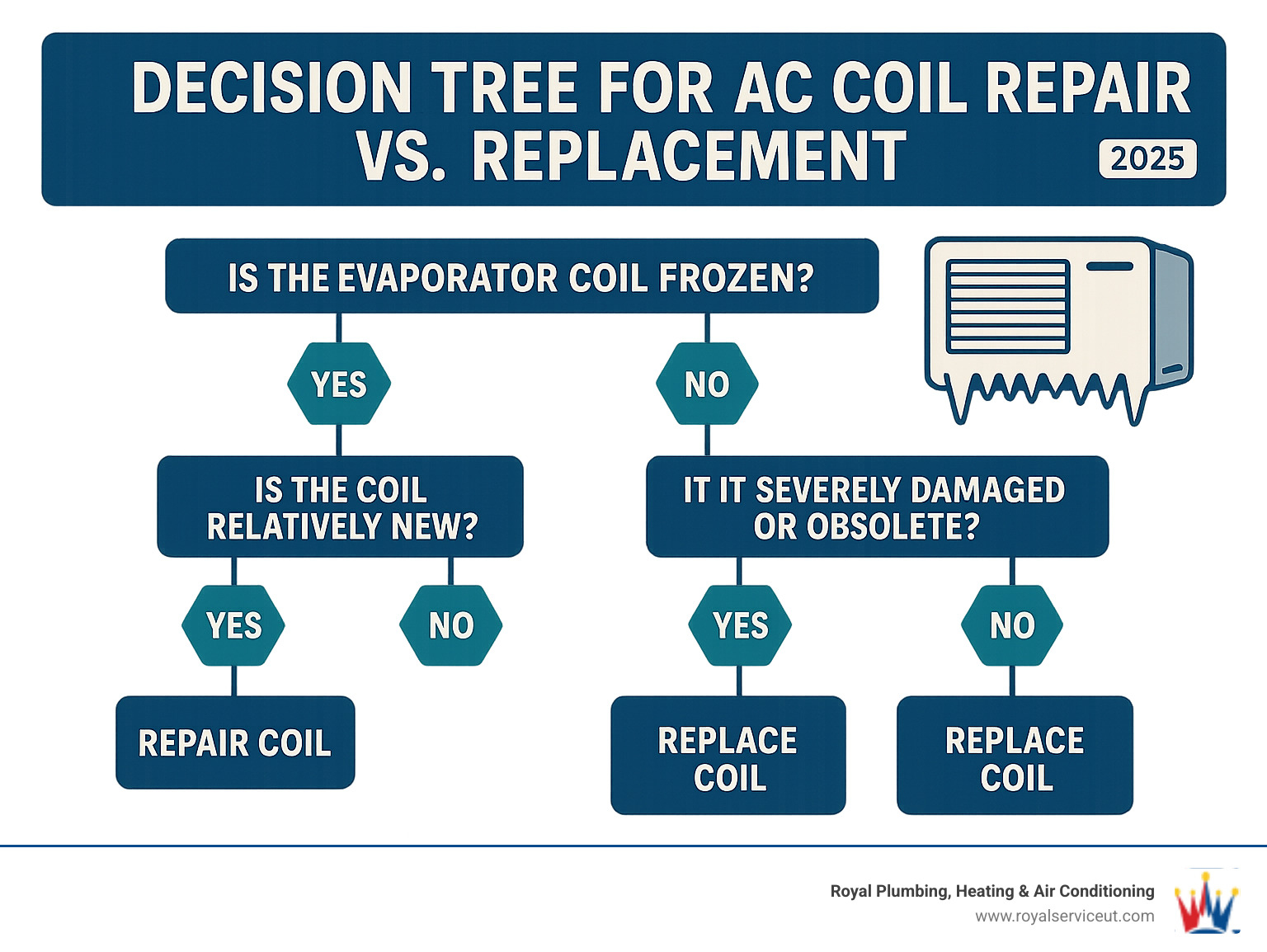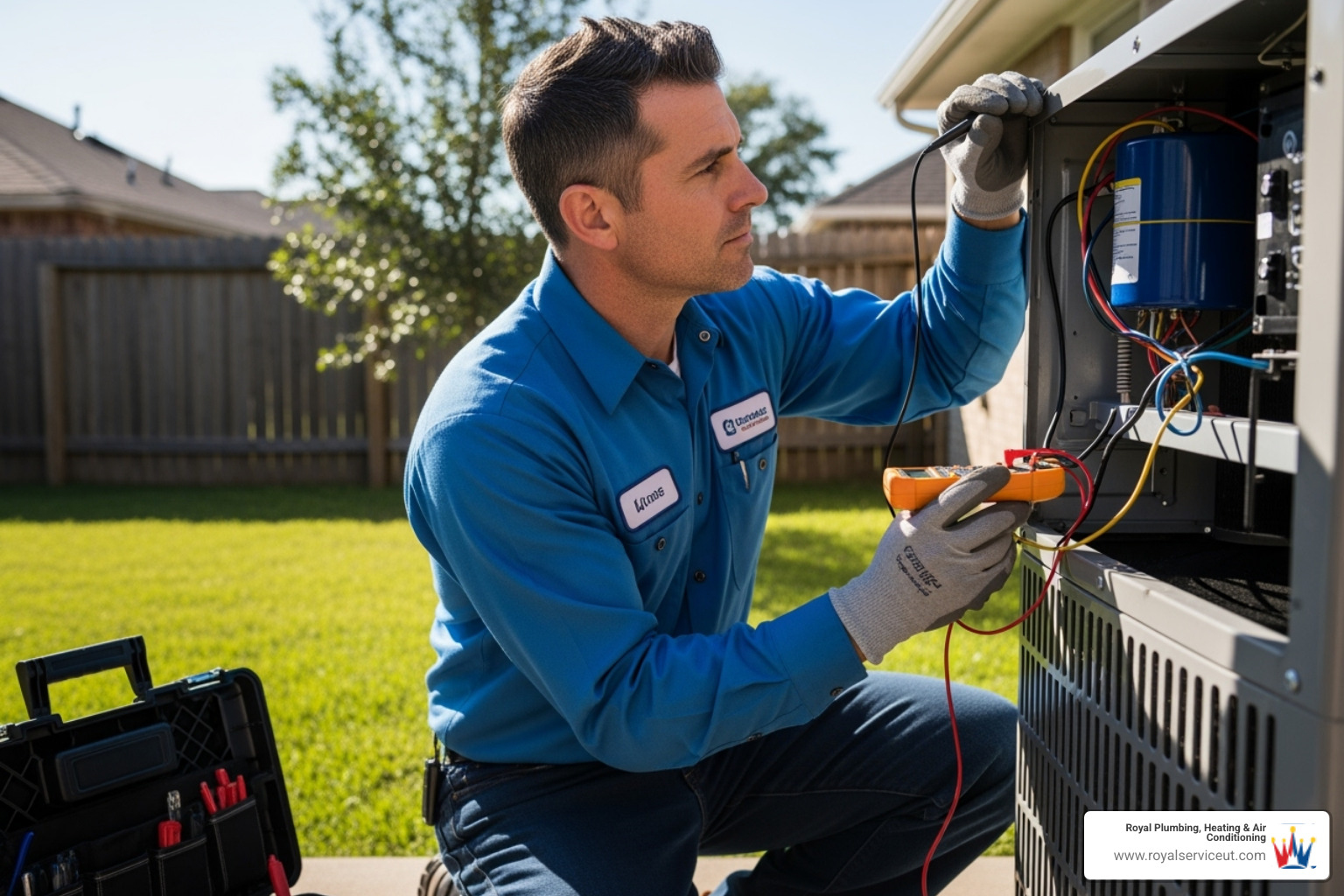Evaporator coil repair becomes a priority when your AC stops cooling, but many homeowners don't know this component exists until there's a problem. Located inside your air handler, the evaporator coil is where warm indoor air is transformed into the cool, comfortable air that flows from your vents.
Quick Answer for Evaporator Coil Issues:
Here's how it works: Cold refrigerant circulates through the coil's tubing as a fan blows warm air across it. The refrigerant absorbs heat from the air, cooling it before it's sent through your ductwork. The now-heated refrigerant then moves to the outdoor unit to release the heat.
When these coils fail, your whole system is compromised. Refrigerant leaks are the most common issue, often caused by corrosion from household chemicals (VOCs) that form acids on the coil. These acids create pinhole leaks that can lead to major cooling failures.
Deciding between repair and replacement isn't simple. While a minor leak on a newer system might be fixable, replacement is often the more reliable long-term solution. Your system's age, refrigerant type, and the extent of the damage are all key factors in making the best choice.

Your air conditioner will give you clear signals when it needs attention. If evaporator coil repair is necessary, you'll notice these common warning signs.
Top 5 Signs Your Evaporator Coil Needs Attention:
Your AC doesn't "use up" refrigerant; it circulates in a closed loop. If the level is low, you have a leak, and the evaporator coil is a common culprit. Refrigerant loss causes system pressure to drop, preventing the coil from absorbing heat. You might notice a sweet chemical smell or see an oily residue near the coil, as refrigerant contains oil to lubricate the system. Professional leak detection is necessary to pinpoint the source of the leak using specialized tools.
A frozen evaporator coil acts like an insulating blanket, preventing it from cooling your air. Ice formation is often caused by blocked airflow from a dirty filter or restricted vents. If you see ice, your first step is thawing the unit. Turn off the AC at the thermostat and switch the fan to "fan only" to circulate air and melt the ice, which can take several hours. Once thawed, the underlying causes—such as low refrigerant, dirty filters, or a clogged drain—must be addressed by a professional to prevent it from happening again.
When your evaporator coil fails, you face a tough choice: go for an evaporator coil repair or replace the unit entirely? The right answer balances your immediate budget with long-term peace of mind, depending on your system's age and the extent of the damage.

Repair can be a smart move for a relatively new AC system (under five years old) with a single, accessible leak. If your unit is still under warranty, repair is often the most cost-effective option. A successful patch on a minor leak can provide several more years of reliable cooling.
However, repairs can be tricky. The coil's tubing is thin, and if a leak is in a hard-to-reach spot, the repair process itself can sometimes cause more damage. We always analyze the situation and costs with you. If the system is newer and the repair is straightforward, it can be a great solution, but it doesn't guarantee other leaks won't appear later.
In many cases, replacement is the more reliable long-term solution. If your coil has severe corrosion or multiple pinhole leaks, patching one spot often leads to another leak appearing soon after. It's a sign the coil material itself is failing.
For older systems, finding obsolete parts can make a proper repair difficult or impossible. A new evaporator coil offers several key advantages:
While evaporator coil repair can work in specific situations, replacement often provides the reliability and efficiency homeowners need for lasting comfort.

Deciding between repair and replacement requires careful consideration of several key factors. Understanding each one will help you make the best choice for your home and budget.
| Factor | Repair Evaporator Coil (Minor Leak) | Replace Evaporator Coil (Coil Only) | Replace Entire AC Unit (Coil + Outdoor Unit) |
|---|---|---|---|
| Cost | Lowest initial cost | Moderate cost | Highest initial cost |
| Longevity | Short-term, risk of future leaks | Medium-term, new coil lifespan | Long-term, new system lifespan |
| Warranty | Often none or very limited | Typically 1-5 years | Often 10+ years |
| Efficiency | Remains at existing level | Can improve if old coil was inefficient | Significantly improved with new, matched system |
| Refrigerant Compatibility | Only if compatible refrigerant is available | Only if compatible refrigerant is available | Always compatible with modern refrigerants |
| Best For | Very new units, minor, accessible leaks | Newer systems with severe coil damage, or older R-410A systems | Older systems (10+ years), R-22 systems, multiple issues |
Your system's age is a primary factor in evaporator coil repair decisions.
The type of refrigerant your system uses is critical.
Look beyond the initial price tag to the total cost of ownership.
The best evaporator coil repair is the one you never need. Like a car, your AC system runs best with regular maintenance, which saves you money on repairs and energy bills while extending its lifespan.

You can make a huge difference in preventing coil problems with a few simple habits:
Nothing replaces the expertise of a professional technician. An annual tune-up, ideally in the spring, is the best way to ensure your system is ready for summer. During a visit, our technicians will:
Regular maintenance is an investment in your comfort, helping you avoid unexpected repairs and keeping energy bills low.
Evaporator coils are hidden components that do a critical job, so it's no surprise we get a lot of questions about them. Here are answers to the most common ones.
Leaks are a frequent problem, usually caused by a few key issues:
Putting off a repair will only lead to bigger, more expensive problems. Ignoring a leak can cause:
While we admire the DIY spirit, this is a job for certified professionals. Attempting it yourself is not recommended due to:
The complexity of professional replacement shows why trained experience is essential for a safe and effective evaporator coil repair or replacement.
When your AC falters, you don't have to diagnose the problem alone. Deciding between evaporator coil repair and a full replacement requires professional expertise to ensure you get a solution that fits your budget and provides lasting comfort.
At Royal Plumbing, Heating & Air Conditioning, we've helped families from Cache County to Salt Lake County stay comfortable for years. Our commitment is to provide honest, straightforward advice without high-pressure sales tactics. We'll thoroughly inspect your system, explain your options in plain English, and help you make an informed decision.
Don't let a failing evaporator coil ruin your summer. The sooner you address the issue, the more options you'll have and the less likely you'll face a complete breakdown on the hottest day of the year.
Ready to get back to the cool comfort you deserve? Schedule your HVAC repair in Salt Lake City with us today. We'll bring the royal treatment right to your doorstep.
Find answers to frequently asked questions about our services.
By reading this blog post, you will gain valuable insights and knowledge that can help you in your daily life.
The purpose of this blog post is to inform and educate readers about a specific topic, providing them with useful information and tips.
The target audience for this blog post includes individuals who are interested in learning more about the topic and seeking practical advice.
You can apply the knowledge and tips shared in this blog post to your own life by implementing them in your daily routine.
The benefits of reading this blog post include gaining new perspectives, acquiring practical skills, and enhancing your overall knowledge on the topic.
Absolutely! Feel free to share this blog post with your friends, family, or anyone who might find it helpful or interesting.
Yes, the information provided in this blog post is reliable and based on credible sources. We strive to ensure the accuracy and quality of the content we share.
The benefits of reading this blog post include gaining new perspectives, acquiring practical skills, and enhancing your overall knowledge on the topic.
If you have more questions related to the blog post topic, please don't hesitate to contact our team. We're here to help!
We value your feedback! If you have any suggestions, comments, or feedback regarding this blog post, please let us know. Your input is important to us.
Trust our team of dedicated professionals for all your HVAC and plumbing needs.